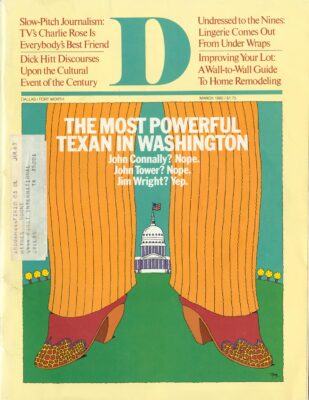“Jim Wright is the best there is at handling your money and mine – the tax dollars, ” says one Fort Worth political sage. “But he’s just not worth a damn at handling his own. “Residents of Wright’s Fort Worth congressional district will be hearing a lot more of that kind of talk this fall, when Wright locks horns with a formidable Republican opponent in the toughest campaign he’s faced in his 34 years in politics.
A lot of issues will surface in the campaign, but almost every one of them will involve money. The opposition will talk about the fact that in 1977, Wright converted $98,701 in surplus campaign funds to his personal use after his staff announced that his personal and political debts had become “hopelessly intermingled.” The move, which was legal by tax statutes and Federal Election Commission regulations, involved paying his debts with about $49,000 and using an equal amount to pay the income taxes on the first $49,000. At the time it happened, the Washington Post editorial page said Wright’s “murky finances” helped perpetuate “cynicism as a way of congressional life.” Wright’s Fort Worth enemies will say it’s just one more example of how Wright has become a jaded Wash-ingtonian, much too freewheeling with the public trust.
Wright’s supporters will say his personal finances and the way he handles them show he’s much too busy being Fort Worth’s Congressman to pay attention to the task of building personal financial security.
“Jim Wright is one of the economically poorest men in Congress,” says Craig Raupe, a former member of Wright’s political braintrust. “That’s because he absolutely refuses to use his position for personal gain.”
Wright supporters will counter any talk of the Congressman’s personal finances with lots of discussion about how he has increased the economic well-being of his district. Wright’s 25-year tenure on Capitol Hill has been marked by his phenomenal ability to steer federal grants and contracts into Tarrant County. A recent University of Michigan study showed Wright’s congressional district number one in the nation in terms of “net gain ” defense contract dollars vs. federal tax dollars paid in the district. While Wright has personally discounted the validity of this $1.6-billion annual gain figure, his supporters will doubtless be quick to pump what has become a Fort Worth legend: Wright is the best in the country at shaking the federal tree and making the apples fall into his district.
All this tree shaking, Wright’s critics will say, has propelled him into a role as one of the worst of the congressional big spenders. Oilman Eddie Chiles, who has become one of Wright’s most vocal adversaries, will say, once again, that “All this federal money which is coming into Fort Worth is just our money anyway. We send it to Washington in the form of taxes and they take out 25 percent or so for administering it and then send it back to us.”
The forum for all this discussion about the relationship between Jim Wright and the almighty dollar will be an ultra-expensive, high profile media campaign, made possible because both Wright and his Republican challenger will have bulging campaign war chests. Both candidates are expected to spend at least $250,000 in the race.
Wright is famous for five-digit campaign fund surpluses, made possible by another of the Congressman’s skills: He is incredibly good at garnering big contributions. The contribution reports for Wright’s 1978 campaign cover a wide spectrum. The groups that contributed $500 or more include political action committees for LTV. Dresser Industries, E-Systems, Westing-house, Amoco Oil, Burger King, Braniff, Frontier and Eastern Airlines, Texaco employees, DRIVE (the Teamsters), the National Education Association, the Realtors, the Chiropractors Communications Committee, Ford Motor Co., the United Auto Workers, Grumman Aviation, Brown and Root Construction Co., Tenneco, American Petroleum Refiners, General Electric employees, and ENSERCH(parent company of Lone Star Gas). Prominent individuals who contributed make up a Who’s Who of Fort Worth – Perry Bass, M.J. Neeley, Clif Overcash, Woodie Woods, even Eddie Chiles (who has left the Wright camp since the last election). And there are some noteworthy Dallas names on Wright’s contribution list: Dallas Cowboys owner Clint Murchison, oil producer J. Lee Youngblood, land developer John Pickens.
Wright has also been tremendously successful in raising money for his Democraticbrethren in Congress (putting together afund of more than $350,000 in 1978), whichis one reason why his opponent in the general election, most likely former Fort WorthMayor Pro Tern Jim Bradshaw, will also bewell financed. Wright spoke for congressional colleagues and Democratic challengers in 80 congressional districts in 1978 andnational Republican forces will be out tokeep Wright busy in his own district duringthe 1980 campaign. So they wilt doubtlessaid Wright’s opponent’s campaign with theweapon that always seems to be the most effective: money.
Related Articles

Arts & Entertainment
VideoFest Lives Again Alongside Denton’s Thin Line Fest
Bart Weiss, VideoFest’s founder, has partnered with Thin Line Fest to host two screenings that keep the independent spirit of VideoFest alive.
By Austin Zook

Local News
Poll: Dallas Is Asking Voters for $1.25 Billion. How Do You Feel About It?
The city is asking voters to approve 10 bond propositions that will address a slate of 800 projects. We want to know what you think.

Basketball
Dallas Landing the Wings Is the Coup Eric Johnson’s Committee Needed
There was only one pro team that could realistically be lured to town. And after two years of (very) middling results, the Ad Hoc Committee on Professional Sports Recruitment and Retention delivered.


